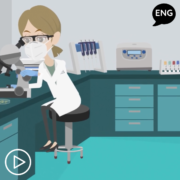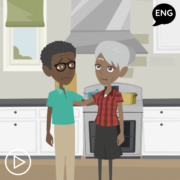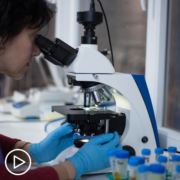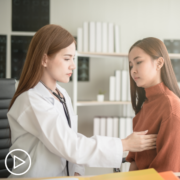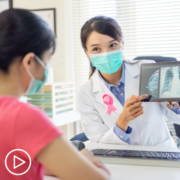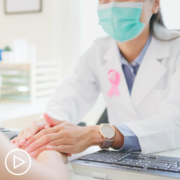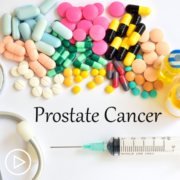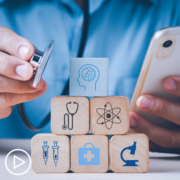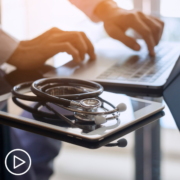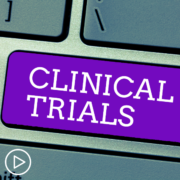What You Should Know About Clinical Trials
What You Should Know About Clinical Trials from Patient Empowerment Network on Vimeo.
What do you need to know about prostate cancer clinical trials? This animated video reviews the clinical trial process and provides questions to ask your healthcare team about trial participation.
See More From Shared Decision Making: Navigating Prostate Cancer Care
Related Resources:
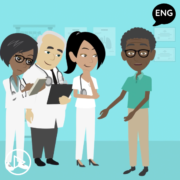
Collaborating With Your Doctor on Your Prostate Cancer Care Plan |
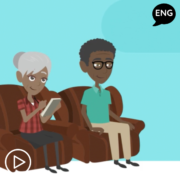
|
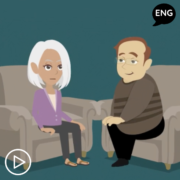
|
Transcript:
Anthony:
Hi, I’m Anthony, and I’m living with advanced prostate cancer. And this is my nurse practitioner, Niki.
Niki:
Thanks for joining us!
Without medical research, advances in prostate cancer treatment can’t move forward. Throughout this video, Anthony and I are going to discuss a key part of research: clinical trials. We’ll review what they are and how they work.
Anthony:
Niki, what is a clinical trial exactly?
Niki:
Excellent question, Anthony. Clinical trials are research studies in people who have a specific condition, or are healthy volunteers, to help find new ways to treat diseases – like prostate cancer.
Most clinical trials examine the safety and efficacy of medicines, vaccines, and other medical treatments.
And clinical trials are the main path for cancer treatments to be approved. The U.S. Food and Drug Administration – also known as the FDA – requires that all new medicines and treatments go through the clinical trial process before they are approved.
So, why would someone consider participating in a trial? Some people choose to participate to access a potential new medicine or treatment that’s not yet approved to see if it helps their condition. And some people want to help move research forward to help others with the same condition – while other people participate for both reasons.
Anthony:
That’s right – advancing research through participation is an important path to new options for treating prostate cancer.
So, Niki – can you explain how clinical trials are designed to answer key questions?
Niki:
Yes, of course. Most importantly, each clinical trial has a protocol, which is a document that sets guidelines that define and outline the activities of the clinical trial as well as who may be eligible to participate.
The early phase trials determine the safety of the treatment, and the latter phases typically examine if the potential therapy is effective.
All along the way, the study clinic staff – including nurses, researchers, and study doctors –check clinical trial participants regularly to monitor for any safety concerns.
Anthony:
But to be successful, clinical trials require people to volunteer. And people interested in participating will have to meet the trial criteria to participate, correct?
Niki:
Yes, that’s correct, and this can include things like a person’s age, disease stage, prior treatments, and overall health. Remember that everyone’s situation is unique.
Anthony:
And people often have misconceptions about clinical trials that prevent them from considering participation. Let’s run through a few common concerns.
For instance, some people worry that they will receive placebo – which is a non-active medicine – if they participate in a clinical trial. Niki, is this true?
Niki:
A cancer patient would never receive only the placebo without the current standard-of-care and will always be told that the trial will contain a placebo in advance of their participation.
Anthony:
OK, that makes sense. Some people also wonder about the risks and safety of a clinical trial. Niki, can you share some information about this?
Niki:
Great question. Most importantly, research must meet ethical standards to ensure that participants are protected. There is a strict screening and testing process that occurs before a person can participate.
And, clinical trials are voluntary – participants have the right to leave the trial at any time.
Additionally, there is an informed consent process, which ensures that people are fully informed about all potential risks and benefits and helps people understand their rights before taking part.
Anthony:
Ok. Thank you for clearing that up. Niki, what about the misconception that clinical trials are just a last-resort treatment option?
Niki:
They are not just a last-resort option at all, Anthony. No matter when a patient was diagnosed with prostate cancer, or where they are in their care, clinical trial participation may be an option.
Anthony:
So, if someone is interested in participating in a clinical trial or learning more about clinical research – where do they start?
Niki:
Your doctor is the best source of information. You can ask your doctor:
- What trials are available to me?
- Is there a clinical trial that you would recommend for me? Why?
- What are the possible risks and advantages of participating in this clinical trial?
- Are there costs associated with the trial, and will my health insurance help cover costs? And if not, is there financial assistance available?
- Where is the trial being conducted? Is there a clinical trial available to me in my local community? If the trial isn’t nearby or convenient, is there transportation and/or housing assistance?
- Finally, if you want to learn more about ongoing prostate cancer research and clinical trials, ask your doctor for a list of credible resources.
Anthony:
Be sure to download the guide that accompanies this video to access a list of these questions and to help you review what you learned.
Niki:
Thanks for joining us! And visit powerfulpatients.org/pc to access more videos with Anthony and me.

